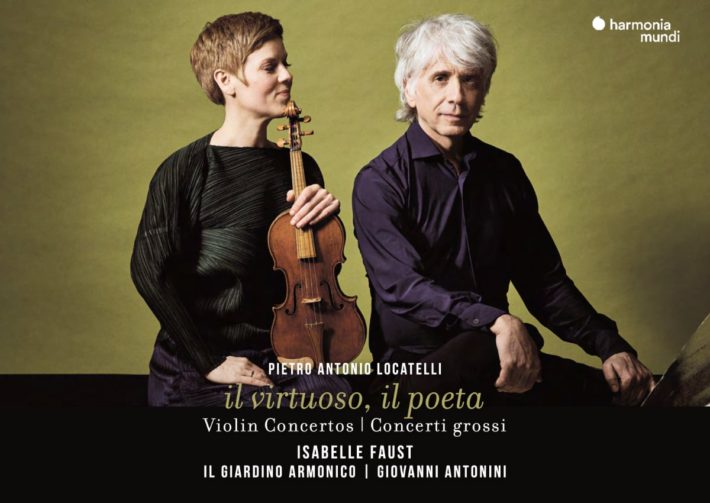Isabelle Faust’s recording catalogue demonstrates her wide-ranging repertoire. Many of those recordings of 20th century works (concertos by Bartok, Berg, Shostakovich, and Stravinsky) are personal favorites, but I find her performances of music from Baroque and Classical periods more impressive still. Her latest album features music by Locatelli, repertoire that clearly shows why today he is often referred to as the ‘Paganini of the 18th century.’
The program opens with Concerto Grosso No. 11, Op. 1. Here is Locatelli the poet, Faust shaping the movement’s melodies with precision and gentle passion. The lilting playfulness of the following Allemande is beautifully captured by both soloist and orchestra as they pass around the melodic material. In the following Sarabande one senses the comfortable intimacy between Faust and this orchestra, surely a result of their many years of concertizing and recording. The concerto ends with an infectiously toe-tapping Giga.
Locatelli’s virtuosic side comes to the fore in the following concerto, No. 11 from L’Arte del Violino, Op. 3. The composer was well-known for playing in the highest hand positions, and we hear evidence of that beginning at 1’00” (Tr. 4). Faust dispatches this passage, and the cadenza with its dizzying arpeggios, with agility and grace, her sound so pure it might be mistaken for a flute. There is a great deal of dynamic variety in the slow movement, Faust and the orchestra often whittling their sound down to a mere whisper. I do wish that in the slow movements Faust might allow the use of more vibrato, though my complaint might have more to do with the recording itself, close and intimate, placing us in a seat right in front, whereas I would prefer a seat further back in the hall.
The program is centered around the “Concerto grosso in E-flat major ‘Il pianto d’Arianna’”. It’s ten movements are predominantly slow, similar in mood to Haydn’s “Seven Last Words.” Both works require a special focus from both performers and listeners. The concerto is programmatic, but Locatelli, like Beethoven in his “Pastoral,” is not trying to paint aural pictures but rather suggest the emotions that arise from the Greek story of Ariadne’s abandonment by Theseus. Faust’s violin is the protagonist, tracing the story’s grief and pain. It is fascinating to discover another composer experimenting with compositional concepts Beethoven is credited with creating decades later. Faust’s playing is seemingly faultless, by turns dramatic, desperate, forlorn and, in the end, alone, though I regret Locatelli’s decision to end the final movement, a deeply affecting lament, with a major chord. Throughout Faust is often partnered by a second violin, in this case Marco Bianchi, who does an exceptional job, never overshadowed by his more illustrious partner.
Related Posts
- Review: Haydn – Complete Symphonies, Vol. 13 – Il Giardino Armonico, Antonini
- Review: Vivaldi, Leclair, Locatelli – Violin Concertos – Théotime Langlois de Swarte, Les Ombres
- Review: Haydn – Complete Symphonies, Vol. 13 – Il Giardino Armonico, Antonini
A second concerto from “L’Arte del Violino” follows. As with the earlier concerto, the outer movements feature a ‘capriccio,’ the composer’s term for a written-out cadenza, unusual for a time in which performers were expected to improvise their own. They feature just about every conceivable challenge for a string player (indeed, these capriccios are what give the collection its name) – large string crossings, double and triple stops, high hand positions, and large stretches for the fingers (in her liner note Faust suggests Locatelli must have had exceptionally long fingers). Faust masters every challenge, and Antonini and his players are exceptionally sensitive and attentive partners.
I sampled readings of the two Op. 3 concertos by Elizabeth Wallfisch and the Raglan Baroque Players (Hyperion). Despite highly accomplished playing by both Wallfisch and her ensemble, these new readings are bolder, more imaginatively conceived. With perceptive and informative program notes by both Faust and Antonini, this album is a complete success. While violin aficionados surely know this repertoire already, it was unknown to me, and I cannot imagine a finer introduction.

Il Virtuoso, Il Poeta
Isabelle Faust – Violin
Il Giardino Armonico
Giovanni Antonini – Conductor
Harmonia Mundi, CD HMM902398
Recommended Comparisons
Elizabeth Wallfisch | Concerto Köln | Jaroslav Krecek | Finnish Baroque Orchestra
Read more classical music reviews or visit The Classic Review Amazon store
Follow Us and Comment:
[social_icons_group id=”964″]
[wd_hustle id=”HustlePostEmbed” type=”embedded”]











